HIT CHANNEL EXCLUSIVE INTERVIEW: November 2017. We had the great honour to talk with a legendary musician: Andy Partridge. He is best known as the vocalist, guitarist and songwriter of XTC, one of best bands during the last 40 years. Andy’s record label, Ape House just released a superb remixed and expanded edition of “Black Sea” album. Read below the very interesting things he told us:
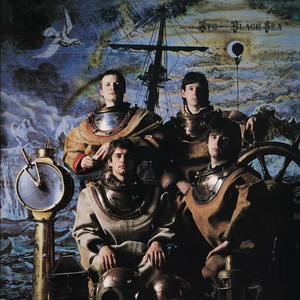 Are you happy with Steven Wilson’s remix of “Black Sea” (1980) album?
Are you happy with Steven Wilson’s remix of “Black Sea” (1980) album?
Absolutely! I’m more than happy with all these remixes that he’s done so far and I’m also more than happy that he does it with great love, because he’s a big fan of XTC. He imparts a lot of love and a lot of care and attention to detail. We talk on the phone constantly. He sends me updates of all the mixes constantly and I ‘m saying: “Can we try a little more this kind of reverb? Can you make that piece a little quieter or a little lighter?” There is never any of his ego in the way. He only wants to please. He approaches the whole project like a giant fan.
Recently, you wrote lyrics to the song “To the Bone” from the Steven Wilson album of the same name. Steven said: “It is about that Trump era idea of truth as a flexible concept”. Do you agree with this description?
Absolutely, I think that Trump is the ultimate narcissist and I think Americans have been extremely foolish to vote the man into power, if in fact did vote him into power. I think Americans, the phrase we use is “blotted their copybooks”, meaning that they ‘ve spilled the great work in the past by voting this man in. Yes, actually the song “To the Bone” never started out as a song about truth. He posted me the music with no lyric. Other than, on the introduction of the song, there was an American friend of his talking about the problems with the races in America, black and white and so on. I said to Steven: “This is gonna be very difficult for me to write this in a balanced way, because I ‘ve only been a white man and it’s very difficult for me to get a glimpse into the other side of the story. He said: “Well, the only lyric I like is my sort of gibberish in the song”. Because he sings “la-la-la”, “ba-ba-ba”, “down-down”, “blah-blah-blah”… He’s feeling that’s the nature of the song. He said to me: “I really like the idea of doing “down and down”, but I don’t know where I ‘m going “down” towards”. I said: “Perhaps, you are trying to get to the truth” and suddenly the whole song became about the nature of the truth: How is different to everybody and about how the desire for truth is manipulated and bent for so many people for different -usually bad- ends.
Was it a difficult process to publish the book “Complicated Game: Inside the Songs of XTC” with Todd Bernhardt?
There have been a couple of book about XTC in the past and I’ve been rather disappointed with them. Because I’m friends with Todd, I did a series of interviews that were initially put them on the Internet. He would call me every month and he would say: “Let’s talk about this song” and we would talk for like an hour or so at any given track on any XTC album. Then, as the years went on, he would say: “It’s a shame that this never came out in book form because people really enjoyed them”. He put the suggestion towards a publisher in England, Jawbone, and they really liked the ideas. So, “Complicated Game” to some extend redresses my disappointment with previous books and hopefully there is “Vol. 2” getting ready to go, where there will be more of these interviews printed up and expanded. Yes, I think it’s the best book about XTC so far.
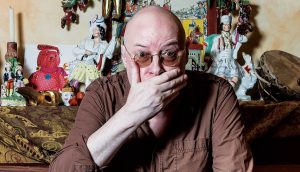 Some people would say that you are revealing the mysteries of songwriting in “Complicated Game”. They would prefer mythology rather than truth. What is your attitude towards secrecy?
Some people would say that you are revealing the mysteries of songwriting in “Complicated Game”. They would prefer mythology rather than truth. What is your attitude towards secrecy?
I don’t like it. I like to reveal all of the magic tricks. For me, when I’m watching a magician, I can be impressed by the trick, but I would be more impressed and I would find the magician more wonderful, if I know how they do this trick. I’m a bit like a surgeon in that aspect: I have to know how the human body works. I have to know which pipes are connected where and which organs do what function. I realized that the best way to do this, is to do it with a dead person and therefore you don’t have the alive mystery of this person. I tend to do that with all of the music I like. I have to know how it is made and if they still want to keep the mystery of XTC songs, then don’t buy the book.
What are the latest news from APE House?
I try to keep people up on things as I do them. APE initially was started as a genuine record label where I hoped to give people what I thought was really good: A chance to get their music heard. Unfortunately, I gave them very-very good terms and I lost a lot of money myself, because these people were frequently making music just in their bedroom or their kitchen or privately. They weren’t touring musicians and so I had to change the nature of APE as years went along and basically to stop losing money. But I tried to give unknown musicians the chance to be heard and I think I did reasonably well, but it became too much of a loss of money for me.
So, anything on APE now has to have my involvement like for example the “Gonwards” (2012) album with Peter Blegvad (ed: Slapp Happy -guitar). That’s myself and Stuart Rowe making the music and Peter Blegvad singing or reading his poetry interwoven with the music. I’m involved into that in a creative way, so that came out on APE. “Powers” (2010) the album where I tried to make the music I heard in my head as a child, when I looked the sci-fi cover artwork of Richard M. Powers, the American artist. As a child, I was a very slow reader but I would enjoy staring at the covers of his books. I heard this unusual music in my head, so the album “Powers” was an attempt to recreate that music I heard as a child inside. So, any project I’m involved with will come out on APE, and of course any time that we can get to look at the past XTC projects and expand them or make them more interesting to people, that would be on APE as well.
 How did it happen to write the song “You Bring the Summer” from the latest Monkees album, “Good Times!” (2016)?
How did it happen to write the song “You Bring the Summer” from the latest Monkees album, “Good Times!” (2016)?
It all happened because many years ago, we were making an album in Los Angeles called “Oranges & Lemons” (1989) and a young man came to us and asked for an interview. I can’t remember what the interview was about, it was for some fanzine or something quite small I think. His name was Andrew Sandoval and I did the interview for him and he was very grateful. Many years later he wrote a book about a day to day chronology of the whole Monkees story and he sent me a copy and it was a very interesting read, because I was a fan of The Monkees as a kid. Later, he went on to actually manage The Monkees and he contacted me and he said: “Look, they are going to make a kind of a comeback album and you were very good to me giving me this interview many years ago. I would like to return the favour and asking to write some songs for The Monkees if you wish”. I was delighted. It was like a boyhood dream come true. I wrote two new ones and I sent them up. I had a bunch of other ones but I just had lying around. They recorded the two new ones that I wrote and did them rather well. So, that was just him kind of returning a favour across the years. I’m glad he did, because it was a delight to work for The Monkees. I loved them as a kid. I still do.
Are you frustrated when other artists, for example Blondie, turn down the songs you write for them?
Yes, it is frustrating and I usually get to hear the albums these artists ask me to write for and then turn me down. I usually get to hear them and I think: “Hm, the songs of mine that you turned down are better than any of the songs that you go on to work and record”. This is something I’m addressing. I intend to play a series of albums where I will be releasing the songs for other artists that I’ve written and they haven’t recorded. Right now, it’s between four and six albums. Yes, it’s very frustrating and I don’t understand it because, as I say, the songs of mine they turn down are usually better than some other ones they go on to record. So, it’s a mystery and I think involves ego and a sense of coolness. I have never ever been “cool”, something I’m quite proud of. This mythical idea of coolness… XTC or I have never ever been cool.
How important was the first Peel Session in June 1977 to the career of XTC?
John Peel was the man that was responsible for us getting a recording contract. He was incredibly-incredibly important to the whole XTC story. The phrase is “we couldn’t get arrested”. We were gigging in London and people were coming out to see us, just small pubs and things in London. Small pubs, small venues, some of them quite tiny, you know. It’s 1977, we ‘ve been working towards making this music for a few years now, really since 1972. We’ve been attempting to get a record deal and nothing has happened, nothing has worked. We sent a cassette of some demo recordings to John Peel and included a poster, a flyer that I had drawn, like a sort of a parody of a horror comic and there was this decaying robot-zombie man kissing a beautiful Hollywood starlet. There was a little box at the bottom of the poster saying: “Insects, iron, lust and rays”. They were like sensational tag words that you might find on the front of a comic from the ‘50s or ‘60s. He seemed to love that. He said that was the thing that brought him along to the gig, not necessarily the music. He was so delighted with this poster and so delighted with this little box at the bottom saying “Insects, iron, lust and rays” that he came along to a show we were playing in London. He was obviously impressed by what he saw and said: “You must come in and record a session for the BBC for my show”. As soon as we recorded that session for the BBC, suddenly three or four record labels wanted to sign us up. So, it was the magic touch. Anything that John Peel liked, record companies immediately thought: “Well, this has to be good. We better check this out seriously”. He is the father of our career.
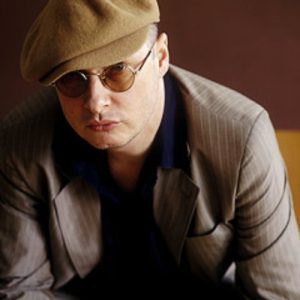 Do you think the creative tension between you and Todd Rundgren ultimately helped “Skylarking” (1986) album?
Do you think the creative tension between you and Todd Rundgren ultimately helped “Skylarking” (1986) album?
No, I don’t think it helped. I think it made it difficult to record. Todd is a man used to get in his own way and used to passing productions through his hands rather quickly. He doesn’t like any dissent or any questioning because this slows down the process for him and he can’t move on to the next production. I’m somebody who likes to have a say in how my baby is going to come out. I don’t like to be the pregnant mother led in a corridor with my vagina sticking through the wall and the doctor just pulls that out and throws it into a dish and say: “Can you give me the next one?” I’m a mother who wants this child be born as perfectly as possible. Todd Rundgren is a wonderful-wonderful arranger. He can arrange things just perfectly and knows how to edit and get to the essence of the song. But he’s a terrible engineer and he’s really-really awful as a producer. If he was a doctor his bedside manner would kill off most of his patients, but as an arranger he’s wonderful. So, it was very difficult to do because I was obliged to shut up and swallow my comments about my own songs, which is extremely difficult to do. Because my songs are my children.
Were you surprised with the commercial success of the song “Dear God”?
Yes, I was. I went for a meeting with Virgin Records after the album was finished. It was originally on the second side of the album in the running order. They said: “Look, we think this song is gonna upset Americans, in fact the American record company was really a bit funny about this song, because of their religious fundamentalism. Do you think we should take this song off the album and put something else on? We have one other song we can put on”. To me, this touched a nerve because I thought I had somehow failed in my quest to write the perfect song about my take on religion, my beliefs or lack of beliefs or my desire to get down to the bone about religion. I said to them: “Ok. Maybe I failed. Let’s take the song off the album” and it became a B-side. Any songs by Colin (ed: Moulding –bass) were deemed by Virgin Records to be maybe the singles. He’s the good-looking one who writes the more attractive melodies. I’m the one with the glasses who writes the weird stuff.
So, his song “Grass” was deemed to be the single and they put “Dear God” on the B-side. Some American radio stations have a habit of turning over the disk and checking out what it’s on the B-side and some of the stations obviously liked “Dear God” and started playing it. It cost one of two reactions: Either people rang in and said: “This is wonderful, please play again. This is exactly how I feel about religion. Please play again” or people would call in and say: “If you play that record again, I’m gonna firebomb your station. You are gonna burn in hell playing this song. This man is a demon”. All the insults known to mankind were flung at me at these radio stations. But some of the stations carried on playing this song and it became like the key that opened us a lot of America to the whole XTC thing. Yes, it was very successful but unintentionally successful, because who would think that a little B-side would cause so much fuss.
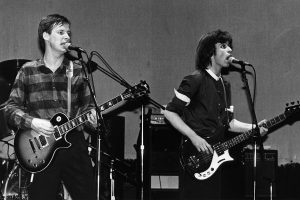 Was it a liberating experience to make The Dukes of Stratosphear albums?
Was it a liberating experience to make The Dukes of Stratosphear albums?
Oh, it’s absolutely wonderful! I recommend every artist, whether a musician, author, sculptor, whatever your art is, I recommend that everyone should have a pretend career. If you are an author, then write books under another name to thank the people who formed your inspiration when you were younger. Or if you are a musician make some records under another name with another sound, something that you liked maybe when you were younger. It’s actually not a new idea: The Beach Boys did an album as “Carl and the Passions” (1972). The Move’s Roy Wood did an album under “Eddy and the Falcons” (1974). Who else? The Beatles almost did that with “Sgt. Pepper’s Lonely Hearts Club Band” (1967). Frank Zappa did a fake doo-wop album (ed: “Ruben and the Jets” -1968). It’s an old-fashioned kind of an idea where you have a costume ball, a masquerade, you dress as somebody else, you act as somebody else. You put a mask on and you are free not to be you. You do not have the responsibility of being you. You can be anybody you like… and it was fantastic fun.
Do you still consider yourself an aggressively optimistic?
Yes, I try to look forward to things in life. The past is very dangerous. Nostaglia. Does “nostalgia” mean the pain of remembering? It’s true: You have to be very careful with the past. It can be a slope: They can pull you in and drown you. You have to look forward to the future, no matter how little you got left. Increasingly, I have little of the future left, but I still have plans and plots and schemes to look forward. Yes, I try to be optimistic because the world can be a wicked place and you have to be kind to yourself and kind to others. I think we only get one shot at it. I don’t believe in an afterlife and I don’t believe in reincarnation. We should all be as nice as possible to ourselves and each other in this one shot of life.
You had been treated so unfairly because you come from Swindon. Did you really understand that?
I didn’t understand initially and it was immensely hurtful and frustrating. But now, I can see perfectly clearly. I can see that Swindon is one of the few comedy towns in England, where you attach this label of it being a stupid town or comedy town. Everything from that town is therefore comical or idiotic and you just have to take the mickey out of it and ridicule it. I’m sure Greece has got some comedy towns as well. You are thinking now. You are going to think: “Where is the Greek comedy town, where everybody from that town and everything we think that comes from that town is stupid?” You are gonna think about while I’m continuing my answer. Yes, it was very difficult because the English have never accepted XTC for this reason. The Americans have no problem, because Swindon doesn’t mean anything to them. The Japanese have no problem, the rest of Europe has no problem. Australia, Canada, New Zealand… Nowhere else has this problem with us, other than England, because of the poorly deserved reputation of Swindon being “the comedy town”. Now, you are gonna tell me what’s the Greek comedy town.
I don’t know about the comedy town, but my hometown (Pyrgos, Elis) has a very bad reputation because of the cannabis plantations.
Aah! So, they think you are all dopeheads?
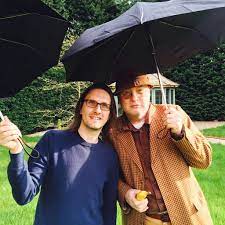 And criminals.
And criminals.
And criminals, yeah. Because of a children’s nursery rhyme (ed: “Wise Men of Gotham”), there used to be a small village in England called Gotham (ed: in Nottinghamshire) and that was considered to be the stupid place where stupid people come from. So much so, when they wrote the Batman stories, they set the Batman stories in Gotham, which was like an American copy of this stupid town in England. But these days, Swindon is the stupid town. It’s just a reputation, I don’t quite know why.
Why many well-known punk musicians denied that they listened to bands like Pink Floyd, Van der Graaf Generator and Soft Machine?
I think it was almost a Pol Pot “Year Zero” mentality, where they had to start a fresh and wipe the slate clean. When I heard this from musicians in 1977, I though there are lying. How can I believe their music if they are lying about where they are coming from? Do you understand what I mean?
Yes. For example, Johnny Rotten (Sex Pistols) was a huge Pink Floyd fan, but he wore a “I hate Pink Floyd” T-shirt?
Yes, exactly, a big Pink Floyd fan. Captain Sensible (ed: The Damned –vocals, guitar) was the biggest Soft Machine fan you could ever find. But these people were denying it. That made me very wary when anyone said: “There is no music before 1977. No Beatles, no Stones, no Elvis”. I thought: “This is a lie. I can’t believe these people and their music if they are lying about where the tree has come from, where this tree has grown”. So, I found that very suspicious. I was very wary when people would say this. I thought it was a lie and I still do.
 Do you think social media like Youtube and Facebook have helped younger listeners to learn about the music of XTC?
Do you think social media like Youtube and Facebook have helped younger listeners to learn about the music of XTC?
Definitely, because we don’t get played on the radio. We never had conventional hit singles. I think the highest single we ever had in England, was a No.10, that was “Senses Working Overtime” (1982). Then, I got into an argument with the producer of the pop show “Top of the Pops” and he said: “You are never coming on this programme again” and that kind of killed off our single career in England. It’s not important that we never got played on the radio, but it seems to be important now that especially younger kids can find our music on the Net and listen to it. That makes me immensely happy because our music is not made for one age or for one era in history. It’s just music and I can understand that more than ever now because I love music from 10, 20, 30, 40, 50, 100 years ago! I just bought myself a lot of CD’s of jazz from the 1910’s and 1920’s. So, it’s all music. I think music doesn’t have a time limit. Good music doesn’t explode 5 years later and cease to exist. It’s good music forever.
Are you happy with the comeback of the vinyl records?
I know the vinyl records sound better than CD’s, because a CD is approximately only one quarter of the musical content. When you hear a CD, ¾ of the sound is actually missing and when you hear an MP3, 123 parts of the sound is missing. When you hear a vinyl album, that was 100% of the recorded sound coming from tape, which is 100% of the recorded sound. So, that’s why it’s analog recording: it’s analogous to the actual sound of the recording. There is no better way of hearing music. Not only do I love the sound of the vinyl, because it is as close to the recorded sound as you can get, I also love the sleeves. The widescreen, wide Cinerama screen of a gatefold sleeve still has not been better. It’s wonderful to open up the gatefold sleeve with a booklet in.
Have you ever met Ray Davies (The Kinks)?
I never have met him but the nearest I‘ve come to that is Dave Gregory, a one-time XTC guitarist went to (ed: Ray Davies’) Konk studio to audition to be Ray’s guitarist on one of these kind of talking tours that Ray occasionally does, where him and another guitarist would play an acoustic version of a Kinks song and then he would talk about how it was written and so. Dave Gregory went along to audition for that role of the other guitarist. As soon as Dave walked in the studio, Ray Davies said to him: “Hey, Dave!!! How is Andy these days?” So, the very fact that Ray Davies knows of me and probably knows some of the songs that I’ve written, makes me very-very happy.
Do you have any musical ambitions left?
Yes, lots. I have to clear the decks. I have so many recordings on computer, on tapes and so on, that I must release to clear the decks, because it’s almost like constipation: I have to move the blockage to be well. So, I have to put a lot of these songs to clear the decks. “Clear the decks” we say, it’s an English phrase. But I also have many other projects: I would like to do more improvised music like the project Monstrance (2007) with Barry Andrews and Martyn Barker. I like improvise music, so I would like to do more of that. I like electronic music and shaping and squeezing wall of sound into a sculptural form. I would like to do more of that like “Powers”. I also have lots of projects: I would like to do an all-vocal album, that’s just all choir and a capella singing. Many-many projects. I would like to make a box set of 10 discs where every band on every disc in that 10-disc set is me. Yes, I have many projects that I want to live long enough to complete, I’m sure.
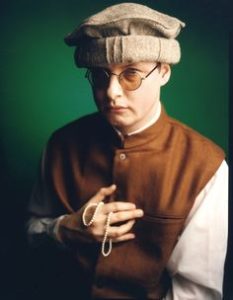 Last year you listened to King Crimson discography. Did you like their music?
Last year you listened to King Crimson discography. Did you like their music?
I go in and out with King Crimson. I like some things that I’ve heard and then there are other things that leave me a little cold. You wouldn’t call me a big fan of King Crimson. I’m very aware of a lot of what they’ve done and I do like some of the things, but I would say it’s a heavy band, but you have to dig in and out of to find satisfaction.
Do you think popular music which was written in the ‘60s and ‘70s is much better than today’s music?
I would say it’s different. It’s simply different. It’s different as music written in the 1920’s to the music written in the 1960’s to the music written today and to the music written in 20, 30, 40 years time. It’s all different. It’s all different sorts of food. Do you want a hamburger or do you want a vegan lunch? Do you want a whole roast ox or would you like a nice piece of fish with some rice? It’s all different food. I don’t like a lot of today’s music because I don’t like the mechanical nature of it. It’s almost like listening to nothing but player piano. It’s all food. It’s just food of a different type. It’s for all tastes. I’ve learned not to be too sarcastic about music, because no matter how awful one thinks music is, there is somebody out there who thinks it’s the best thing he have ever heard. It’s all music. There is no such thing as bad music.
A huge “THANK YOU” to Mr Andy Partridge for his time and to Pete Morgan for his valuable help.
Ape House official website: https://www.ape.uk.net

